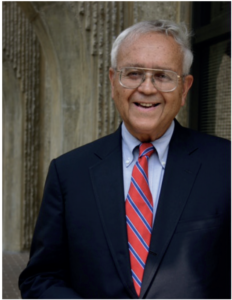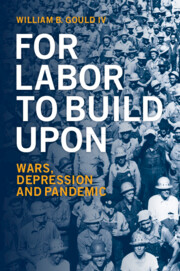LSE Labour Law in Retrospect: an interview with Professor William B. Gould
(Originally published by LSE Ratio in 2022)
In the 1960s, LSE was a central node in the developing field of comparative labour law. It was at that time that the preeminent scholar of U.S. labor law, William B. Gould, spent some time in the Department of Law before going on to a storied career in academia and industrial relations. We talked with Professor Gould, inviting him to reflect on the experience and influence of his time at LSE.

In the early-mid 1960s, the LSE Law Department was home to such pre-eminent labour law professors as Sir Otto Kahn Freund and Lord Wedderburn. Was it their presence that drew you to LSE as a young labour lawyer, or how else did you find yourself in London?
The presence of Professor Kahn Freund was a principal attraction (Wedderburn was not yet at LSE – he would arrive three or four years afterwards – I came to know him later in the 60s during some of my visits to London). I was aware of Kahn Freund’s pre-eminence as a comparative labor lawyer and both his name and the School were something of which I became aware through a British friend when I was studying at Cornell Law School, Inge Hyman (née Neufeld) of Manchester University. Initially, based upon discussions with Mrs. Hyman and my own readings, I knew of LSE through the writings of Harold Laski and others. I don’t think that I began the Holmes-Laski Letters until my return to America in 1963. Mrs. Hyman’s recommendation was so strong and lasting that it stayed with me even though I was hired into my ideal job subsequent to graduation from Cornell Law School as Assistant General Counsel for the United Auto Workers in Detroit. I gave up that job to come to LSE.
What was the focus of your research at that time, and how did your time at LSE and in England generally inform the canonical work that you went on to do subsequently?
The focus of my general research was threefold: (1) comparative labor law with Professor Kahn Freund; (2) comparisons between the American and British labor-management and labor law systems, and (3) the relationship between unions and politics. Much of this informed the work which I did subsequently. Illustrative of the first theme would be my book, Japan’s Reshaping of American Labor Law (MIT, 1984) and other articles. Illustrative of the second theme would be ‘Taft-Hartley Comes to Great Britain: Observations on the Industrial Relations Act of 1971’, 81 Yale L. Rev. 1421 (1972), and a paper which I gave at Chatham House in London when I was Chairman of the National Relations Labor Board (reproduced in Labored Relations: Law, Politics, and the NLRB – A Memoir (2000). Aspects of both these themes have woven their way into the many editions of A Primer on American Labor Law (MIT and Cambridge, 1st edition 1982, 6th edition 2019). My writings about the third of the above themes did not take form until ‘Organized Labor, the Supreme Court, and Harris v Quinn: Déjà Vu All Over Again?’, 2014 Sup. Ct. Rev. 133 (2015) and ‘How Five Young Men Channeled Nine Old Men: Janus and the High Court’s Anti-Labor Policymaking’, 53 U.S.F.L. Rev. 209, (2019).
Aside from my classes with Kahn Freund, Phelps Brown, Burt Roberts, I attended political science classes, and lectures. Through my UAW friends like Victor Reuther, I was able to meet such political leaders as Dennis Healey, Deputy Leader George Brown, CAR Crossland, author of The Future of Socialism, The Conservative Enemy, as well as RHS Crossman and Minister of Labor Ray Gunter. When I first went to TUC Headquarters in London in the fall of 1962, I was greeted by George Woodcock. Within a week of my arrival, I attended the Labor Party Conference in Brighton where Hugh Gaitskell gave his “One Thousand Years of History” speech. My one Conservative Party leader meeting was with Sir Keith Joseph, who was a member of the Macmillan cabinet.
What similarities and differences would you identify when comparing approaches to labour law in the UK and U.S.? How do you think your career might have been different had you stayed in the UK? Was that an option at the time?
The principal differences lie in union structure, dispute resolution, and the role of law. Kahn Freund frequently said to me “You Americans have too much law”. History brought the unions to Britain before law – at least law which protected the unions. The opposite was true in the United States, as Kahn Freund would often say.
The question of whether my career in Britain would have been different than what it turned out to be is quite difficult to speculate about. Surely it would have been very different. I was not yet an academic – but I think that I applied for and received some interest from Lancaster University. I was offered a position with the International Labor Organization in Geneva, Switzerland but not in a department which was to my liking.
That year in London made me aware of how fundamentally American I am. This often brings me back to the George Bernard Shaw reference to two nations separated by a common language.

As the author of 11 books and more than sixty law review articles, how does your fascinating new book – For Labor to Build Upon: Wars, Depression and Pandemic – fit with your previous work? What was your motivation in undertaking that study, and can you give us a precis of the book and its findings?
In some respects, I see this book as the summing up of where I have been and how my thinking has changed. My motivation was rooted in the fact that organized labor has had such difficulty over the years and that the explanations for its decline had not been properly analyzed and discussed. The closest that I had come to this was my 1993 book Agenda for Reform (MIT, 1993). I have been increasingly concerned with what I regard as facile explanations for labor’s decline, and the fact that aside from a book by Leo Wolman in the 1930s, very little attention has been given to the role of cataclysmic changes like war, depression, and now pandemic, in assessing trade union growth and decline. I have become increasingly impatient with the writing in this country which seems to and does assume that law can appreciably alter developments in this arena. Law, though symbiotic in its relationship to union growth and decline, is subordinate. That is my message. And I think it is a message which might resonate well today with my LSE tutor, Otto Kahn Freund.
Is there particular work – both of your own, and that of your 1960s colleagues at LSE – that you think has been particularly impactful in the law and practice of your field? Is there any research that you wish had been, or might now be, more influential?
Kahn Freund’s writing, particularly on comparative labor law, has impacted me considerably. My one area of regret is that I did not follow through on and complete fully some empirical work on dispute resolution in the 70s.
If you compare and contrast British and American approaches to teaching and learning and the intellectual environment, how would you describe it?
At the time I came to LSE as a young student there was a sharp difference between teaching and learning there and the intellectual environment in law school in the United States. Indeed, the major consideration in leaving Detroit (though I enjoyed it immensely) and coming to London lay in the fact that I thought that law school had destroyed my ability to write well and to think clearly about the relationship between law and the real world outside of decided case law. I needed to be reinvigorated intellectually and my year in London provided that.
Today it is quite different. I think that our students here at Stanford Law School have an exposure to a rich diversity of courses, teaching methods, and different teachers that I never had as a student.
Given your long-standing connections to the LSE Law School, we are enormously happy to have your contribution to Ratio. Why do you find it important to stay connected as an alumnus?
I think that most of my answers provided above make it obvious. I count that period as a formative and creative period due to voracious reading, attendance at lectures throughout London and Britain and Europe. Moreover, I met my wife during that year in London (she was teaching remedial courses at LSE – she had already obtained a Master’s at LSE and a Bachelor’s Degree at Manchester) and as the result of that, I now have three children and four grandchildren. The year at LSE made all of this possible.
William B. Gould IV is Charles A. Beardsley Professor of Law, Emeritus, at Stanford Law School. Former Chairman of the National Labor Relations Board (NLRB, 1994–98) and Former Chairman of the California Agricultural Labor Relations Board (2014-2017). Professor Gould has received five honorary doctorates for his significant contributions to the fields of labor law and industrial relations. Graduate study London School of Economics 1962-63.
